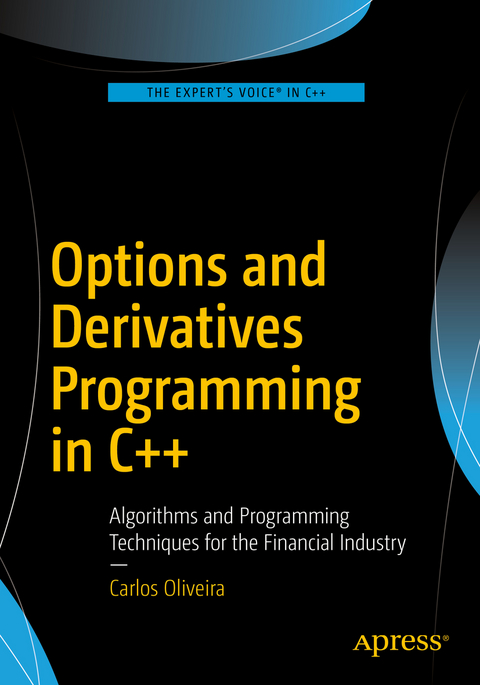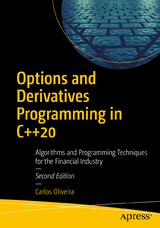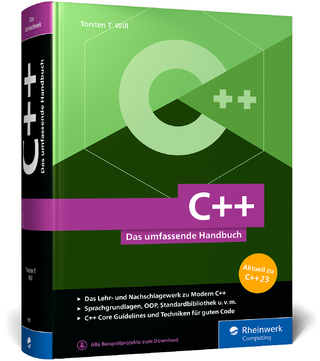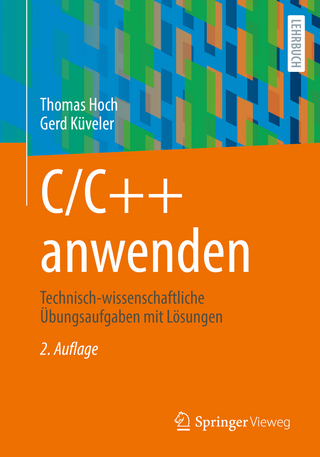
Options and Derivatives Programming in C++
Apress (Verlag)
978-1-4842-1813-6 (ISBN)
- Titel erscheint in neuer Auflage
- Artikel merken
Learn how C++ is used in the development of solutions for options and derivatives trading in the financial industry. As an important part of the financial industry, options and derivatives trading has become increasingly sophisticated. Advanced trading techniques using financial derivatives have been used at banks, hedge funds, and pension funds. Because of stringent performance characteristics, most of these trading systems are developed using C++ as the main implementation language.
Options and Derivatives Programming in C++ covers features that are frequently used to write financial software for options and derivatives, including the STL, templates, functional programming, and support for numerical libraries. New features introduced in the C++11 and C++14 standard are also covered: lambda functions, automatic type detection, custom literals, and improved initialization strategies for C++ objects.
Readers will enjoy the how-to examples covering all the major tools and concepts used to build working solutions for quantitative finance. It includes advanced C++ concepts as well as the basic building libraries used by modern C++ developers, such as the STL and Boost, while also leveraging knowledge of object-oriented and template-based programming.
Options and Derivatives Programming in C++ provides a great value for readers who are trying to use their current programming knowledge in order to become proficient in the style of programming used in large banks, hedge funds, and other investment institutions. The topics covered in the book are introduced in a logical and structured way and even novice programmers will be able to absorb the most important topics and competencies.
What You Will Learn
Grasp the fundamental problems in options and derivatives trading
Converse intelligently about credit default swaps, Forex derivatives, and more
Implement valuation models and trading strategies
Build pricing algorithms around the Black-Sholes Model, and also using the Binomial and Differential Equations methods
Run quantitative finance algorithms using linear algebra techniques
Recognize and apply the most common design patterns used in options trading
Save time by using the latest C++ features such as the STL and the Boost libraries
Who This Book Is For
Professional developers who have some experience with the C++ language and would like to leverage that knowledge into financial software development. This book is written with the goal of reaching readers who need a concise, algorithms-based book, providing basic information through well-targeted examples and ready to use solutions. Readers will be able to directly apply the concepts and sample code to some of the most common problems faced in the analysis of options and derivative contracts.
Carlos Oliveira works in the area of quantitative finance, with more than ten years of experience in creating scientific and financial models in C++. During his career, Carlos has developed several large-scale applications for financial companies such as Bloomberg L.P. and F-Squared Investments. Carlos Oliveira obtained a PhD in Operations Research and Systems Engineering from the University of Florida, an MSc in Computer Science from UFC (Brazil), and a BSc in Computer Science from UECE (Brazil). He has also performed academic research in the field of combinatorial optimization, with applications in diverse areas such as finance, telecommunications, computational biology, and logistics. Carlos has written more than 30 academic papers on optimization, and authored three books, including Practical C++ Financial Programming (Apress, 2015).
Chapter 1: Options ConceptsChapter 2: Financial DerivativesChapter 3: Basic AlgorithmsChapter 4: Object-Oriented Techniques Chapter 5: Design Patterns for Options Processing Chapter 6: Template-Based Techniques Chapter 7: STL for Derivatives Programming Chapter 8: Functional Programming Techniques Chapter 9: Linear Algebra Algorithms Chapter 10: Algorithms for Numerical AnalysisChapter 11: Models Based on Differential EquationsChapter 12: Basic Models for Option PricingChapter 13: Monte-Carlo MethodsChapter 14: Using C++ Libraries for FinanceChapter 15: Credit Derivatives
| Erscheinungsdatum | 12.10.2016 |
|---|---|
| Zusatzinfo | 18 Illustrations, color; 8 Illustrations, black and white; XXIII, 260 p. 26 illus., 18 illus. in color. |
| Verlagsort | Berkley |
| Sprache | englisch |
| Maße | 178 x 254 mm |
| Gewicht | 5453 g |
| Themenwelt | Informatik ► Programmiersprachen / -werkzeuge ► C / C++ |
| Mathematik / Informatik ► Mathematik | |
| Wirtschaft ► Allgemeines / Lexika | |
| Wirtschaft ► Betriebswirtschaft / Management | |
| Schlagworte | Back Testing • Black-Sholes • Credit Default Swaps • credit derivatives • Derivatives • Forex derivatives • Machine trading • Monte-Carlo • options • Quantitative Finance • Trading |
| ISBN-10 | 1-4842-1813-2 / 1484218132 |
| ISBN-13 | 978-1-4842-1813-6 / 9781484218136 |
| Zustand | Neuware |
| Haben Sie eine Frage zum Produkt? |
aus dem Bereich



